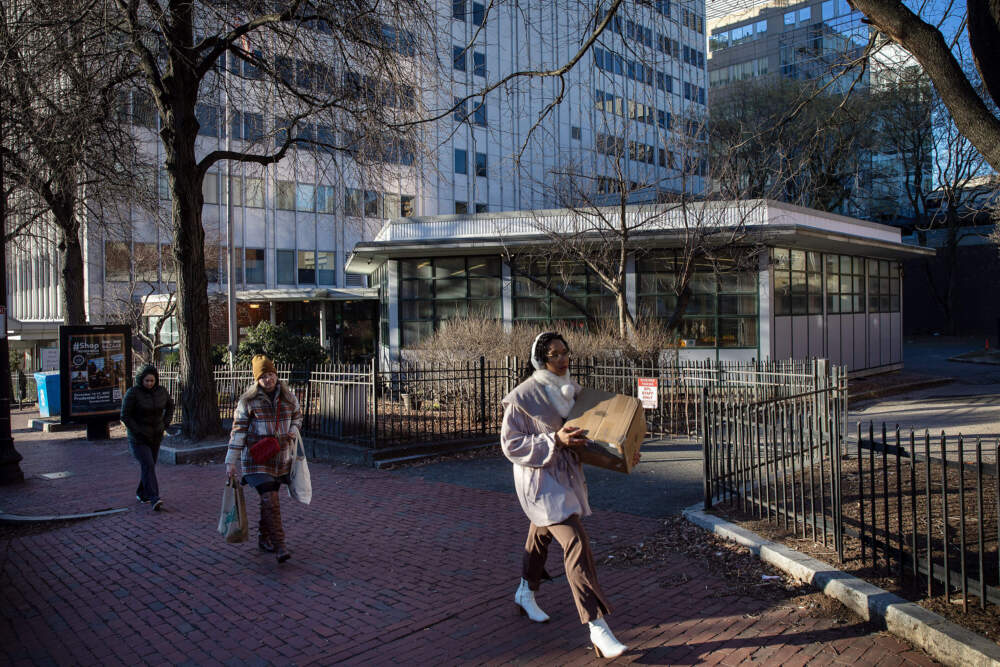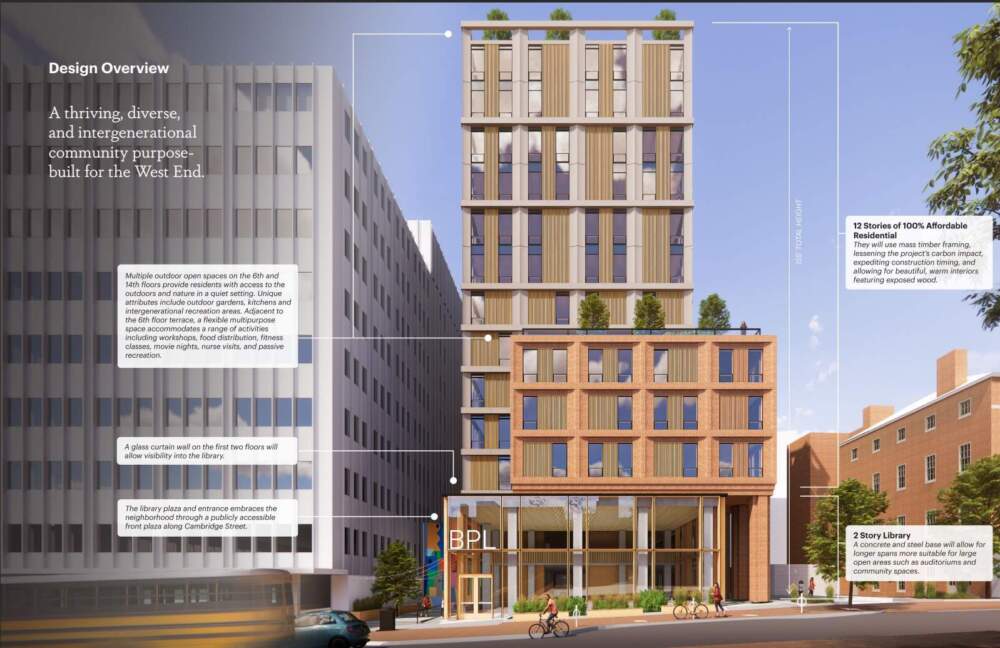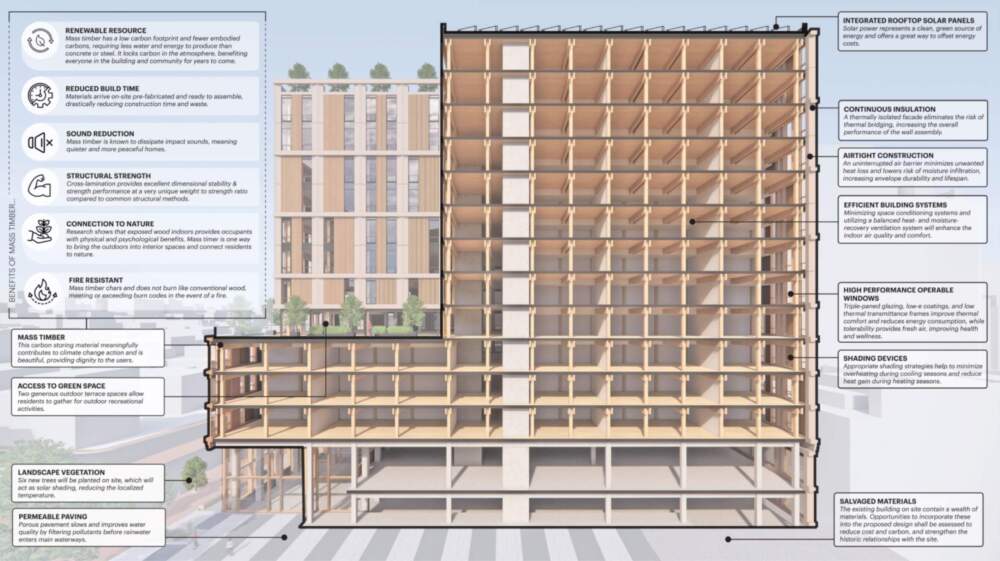Advertisement
Boston is using public buildings — like libraries — to build affordable housing. It's still pricey

Under pressure to create more affordable housing, the city of Boston plans to build on top of properties it already owns, like libraries. But the cost of these developments is far from modest — $835,000 per unit in one case.
In the West End, just steps from Massachusetts General Hospital and downtown Boston, the city will spend $12 million to rebuild the library. Developers will then build 119 subsidized apartments on a dozen floors over the book stacks, at an estimated cost of $113 million.
The project, as currently pitched, would be among the most expensive Boston has seen for similar developments. And the construction comes on the taxpayers' dime, with federal funding the chief source for the project.
But Rodger Brown, from the nonprofit Preservation of Affordable Housing, or POAH, which won the bid to develop the site at 151 Cambridge St., says it's worth it.
"Boston's got a long history of being a segregated city," Brown said. "If we want to be successful moving into the next century and beyond, we've got to think about how we make everybody part of the fabric of the city."
The price represents a sharp increase over recent costs for building subsidized apartments in Boston. Over the last two years, a dozen proposed developments across the city were estimated to cost an average of $651,000 per unit, public records show. And the cost estimate is far higher even than similar projects. The city's two other housing-over-library projects, in Chinatown and Dorchester, are slated to cost about $625,000 per unit.

Developers say a mix of factors contribute to the cost estimate of the West End project, including high interest rates, material prices, pay governed by prevailing wage rules, as well as the dense location close to Beacon Hill and downtown.
"We’re experiencing ripple effects from the pandemic" in terms of costs, said Brown, who is head of real estate development at POAH, the developer. "We're hoping that some of that calms down, but in the moment, it's hard to predict that things are going to get drastically better in the short term."
Adding to the complexity of the West End plan: it's more expensive to build in a congested neighborhood, above a library, than to put up a smaller building on a vacant lot.
Paul Craney, of the nonprofit Mass Fiscal Alliance, questioned the prudence of spending scarce government housing dollars on more expensive units.
“Is it much cheaper to build somewhere else, where you’ll get the same kind of housing?” Craney said. “At what point does the cost outweigh the benefit?”
City officials say the West End estimate is preliminary and could come down in future iterations of the plan. They also said the plan calls for less money from the city compared with seven other proposals to develop the library site.
The housing-above-libraries idea has been in the works since 2018, when the city launched a program to consider adding apartments to public properties, such as fire stations, parking lots and public libraries. The first projects coming to fruition include libraries in Chinatown (12 stories and 110 units), Upham's Corner in Dorchester (four stories, 33 units) and the 12-story West End project.
"Not only will they be getting a world class library, but also we're not missing the chance to make this neighborhood more accessible to families that need affordable housing," said Joe Backer, the city's point person for the development.
He and others say more affordable housing is needed in the West End, where many buildings were razed in the late 1950s, in perhaps Boston's most controversial urban renewal effort, dislocating thousands.
"We think that land owned by the city of Boston in many cases can be used for multiple public benefits," Backer said.
Unlike affordable housing that is built with an expiration date, Backer said the new units will be affordable in perpetuity, meaning no future owner can convert them to market rate. All 119 of the West End apartments will be reserved for low- and moderate-income renters: 40 units for households earning up to 30% of Boston's median income; 19 at 60% of median income and 60 at 80%.
The city currently calculates median income for a two-person household at $118,800. Developers estimate a two-bedroom apartment at the West End location would cost $1,950 a month for renters earning 60% of the median.
In order to comply with new building standards, the proposal details a highly efficient Passive House design, including continuous insulation, electric heat, solar panels and triple-pane windows. The building would also be the first 100% affordable high-rise in Boston to use "cross-laminated timber," a wood-based material that uses less carbon than conventional steel framing.

These features contribute to the cost of building, though proponents say using quality materials and efficient systems saves money in the long run.
Affordable housing is more costly to build than market-rate developments for a number of reasons, said Alexis Smith, a housing specialist who researches construction costs at the Metropolitan Area Planning Council.
Smith said market rate developers are projecting per-unit costs between $500,000 and $600,000 in the city. Affordable development is far more complicated to finance, she said, involving an array funding sources from the public sector, as well as government resources. And compared to market-rate development, subsidized construction requires more community outreach and government compliance.
Smith estimates that 85% to 90% of funding for affordable housing development comes from government coffers — primarily federal but also state and local dollars. Once built, developers count on a flow of more government money — rental subsidies such as Section 8 vouchers — to fund operating costs and pay down debt.
POAH, the nonprofit developer, will hold a 75% stake in the housing. The remaining share will be owned by a Boston-based investment firm, Caste Capital. Developers say the West End library apartments could come online by March 2027.
Caste's Patrick Kimble said this is his firm's first affordable housing development and he feels it has special significance: “You pair affordable housing with a public asset like a library. It’s pretty symbolic.”
